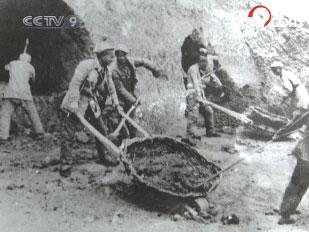Source: CCTV.com
01-31-2008 12:47
Yanan - Hope from Hardship (I) >>
 |
The land I stand on here is a land of agricultural feat, a place called Nanniwan. Just over 50 years ago, this land was remote and barren, rarely visited by human being, but in the 1940s, it was transformed into a lush, fertile farmland farmed by an army brigade in 3 short years. This is an example of sheer man power. In this show we will learn and explore more about the magic in Yan’an.
As a result of the Sino-Japanese war, the city of Yanan suffered from an extreme shortage of food and clothing, due to blockades set up by enemy forces. Diets were barely nourishing, consisting of beans and wild weeds, and clothes became tattered rags. The government response was to have every person and household become self-sufficient at weaving their own clothes and growing their own food. Thus, the famous Self-Sufficiency movement was launched.
This is the Chinese version of spinning wheel, I guess I will have a try. I feel like thrown back to old time, using a Chinese spinning wheel Actually during the 1940s the communists launched a self-sufficient movement. A movement that really promoted spinning and weaving. Premier Zhou Enlai proved him to be esp. skillful at this art.
Females were traditionally the only ones to participate in spinning and weaving. In Yanan, these activities would come to be practiced by everyone, from top leaders down to every soldier and each capable child.
Yan Han said, “Each day, I was able to spin about 1/4 kg of cotton into yarn. In those days, I really could spin high-quality yarn.”
People didn’t seem too bothered by all the difficulties of the time, and actually seemed to rather enjoy engaging in manual labour.
Besides spinning and weaving, another key aspect to the Self-Sufficiency movement was to be able to till one’s own land.
Yan Han said, “Everyday we would climb up the mountain to till the land. I was assigned to bring water and lunch to the workers. We all ate lunch atop one of the hills. I carried a big bucket on each shoulder, one filled with boiled water, another with food. I didn't take any breaks on my way up the hill. I would bend, like this, to get the buckets up to the top of the hill.”
As it was wartime, even children needed to participate in these activities, just for survival.
